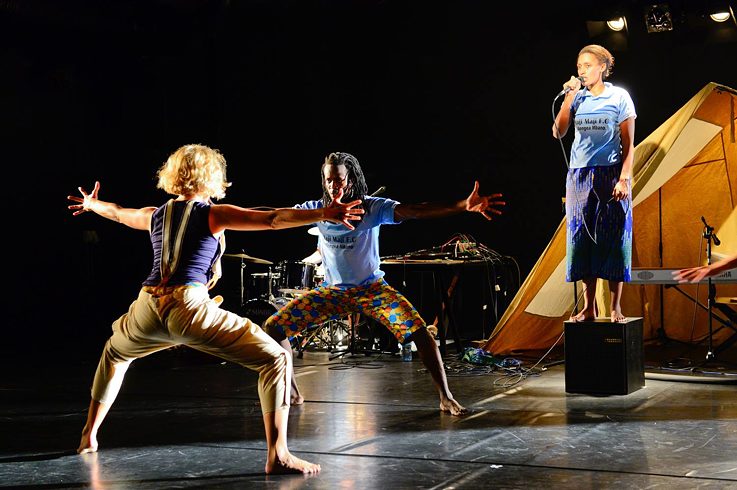Flinn Works (Berlin/ Kassel) was founded in 1992 and is led by artistic director Sophia Stepf in close collaboration with Lisa Stepf (concept and networking), Konradin Kunze (concept and project direction) and Helena Tsiflidis (company management). It has independently produced and presented more than 20 productions in a wide range of different venues and festivals. Always engaging with current social and political issues, the company devises its work in collaboration with professional artists and performers. Flinn Works has expanded its activities beyond Europe, with the input of writers, performers and musicians from other countries, including India, Bangladesh, Tanzania and Nigeria.
Invited by the Goethe-Institut Kigali, the sisters Lisa and Sophia Stepf travelled to Rwanda for the first time. As part of their research trip to Rwanda on the topic of feminism, Sophia and Lisa conducted the three-day workshop "Doing Gender" at the Goethe-Institut Kigali. The idea was to critically examine the role of women in Rwandan society together with the 12 participants* and to work out to what extent Rwanda can actually live up to its reputation as a pioneer.
You conducted a workshop at the Goethe-Institut from 11 to 13 March 2019. What methods did you use to talk to the workshop participants about "Doing Gender"?
We used different creative exercises, for example: the participants had to create 1 minute solo performances first about “femininity” and then “masculinity”, the solos were combined in a performance structure. They also had to create a utopian product for gender equality and design a TV ad for this product. There were also classical techniques like slow motion, the “Art of Watching” and Dramaturgy included in the workshop.
Let's come to your first impression of Rwanda, the country where more women sit in parliament than in any other country in the world. What ideas of feminism did you encounter here?
It seems complex and diverse. We spoke to a lot of different women, from artists to chicken farmers, from hair dressers to museum directors, security women to gender officers on a district level. What did we learn - the lives of women have improved considerably since 1994, new laws for inheritance, laws agains domestic violence, quotas for political representation and education for all girls (at least on a primary and secondary level) are in place, so many women reported they feel “empowered” and have choices and opportunities. But we also realised that culture and mindsets change much slower than laws and many women still seem to do all the housework, care work and child rearing on top of their careers. The classical 'Doppelbelastung' as we say in German seems to be ubiquitious. But we also met young people who both work and share the responsibilities at home. Some older cultural limitations concerning certain activities (like drumming) or behaviour (like smoking and drinking) still seem to be in place for women.
After the workshop, it's time for both of you to go home. What will be the next steps for the project?
Apply for funding to realise the theatre production next year and transcribe the hours of interviews we took. We will also do more research ane read, among others, “Petit Pays”, Afrotopia by Felwine Sarr and books about african feminism by Oyeronke Oyewumi and Amina Mama.
Sophia and Lisa, you have already worked on the African continent in Nigeria and Tanzania, have now been to Rwanda for the first time. What is your first impression and is there something that you will especially remember?
People are softspoken and polite. As a Muzungu, you do not have to negotiate very hard to get a decent price for a Moto-taxi ride for example. The city is exceptionally clean and well kept. We also felt very safe – in no other African city have we felt so safe walking around at night. What we found exceptional is that there is no street food and not much eating on the road side. Also that in some houses the kitchen seems to be separate and away from the house surprised us. When we learned that traditionally there was only 3 kinds of food grown here and cow milk was the primary 'food' it made sense. We ate twice at a small local place in Nyamirambo, beans and chapati and tea. The food was great. We also saw a performance by the lady drummers in Huye, which we will not forget: The power and joy and mastery of the craft was stunning.
Many thanks for the interview and a safe journey home!
